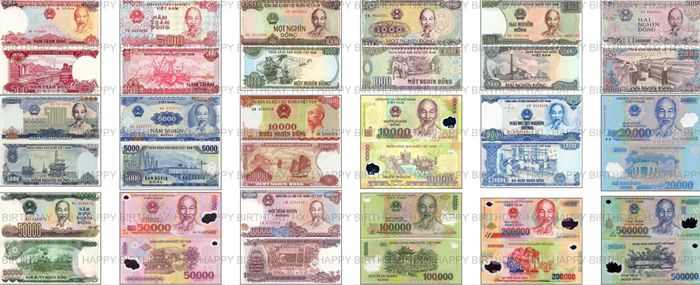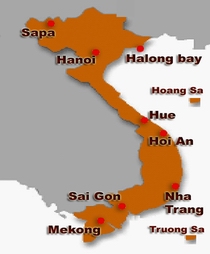
vietnam currency, money exchange...

Exchange rates in Vietnam
For official exchange rates daily between Vietnam Dong and other currencies please visit https://www.vietcombank.com.vn/KHCN/Cong-cu-tien-ich/Ty-gia
What Is Vietnam Currency?
The Vietnam official currency is called Dong. Its symbol is ₫ while the code
is VND. Currently, only the State Bank of Vietnam has the legal title to issue
Vietnamese banknotes.
According to current Vietnamese law, the Vietnam Dong is the only legal means of
payment in Vietnam, which means that goods or services in the Vietnamese market
must be listed in VND.
Denominations of Vietnamese currency
Banknotes in circulation in Vietnam range from denominations of 100 Dong to
500,000 Dong. However, the habit of rounding and not saving the small
denominations of the Vietnamese is causing the 100 Dong and 200 Dong notes on
the bank to disappear. The 500 Dong and 1,000 Dong banknotes are in the same
situation but are still in circulation. Coins are available in 200 Dong, 500
Dong, 1000 Dong, 2000 Dong and 5000 Dong but due to inflation, they have not
been minted since 2013 but it is still legal to trade in coins. Because of
memory value, many decide to keep them for collection.
Currently, both polymer banknotes and paper banknotes are used in Vietnam.
- Polymer banknotes exist of 10,000 Dong, 20,000 Dong, 50,000 Dong,
100,000 Dong, 200,000 Dong, 500,000 Dong
- Paper banknotes that have often circulated in denominations of 500
Dong, 1,000 Dong, 2,000 Dong, 5,000 Dong.
How to change and withdraw cash in Vietnam?
As explained above, the only legal commercial currency in Vietnam is the Dong
(VND). However, it is almost impossible to exchange Dong in advance from your
country because Vietnamese currency is not so popular all around the world. This
means that if you travel to Vietnam, you can bring your currency (USD, Euro,
ect�) directly and exchange it for Vietnamese currency.
In Vietnam, you can exchange and withdraw money from:
- Bank: this is the safest transaction method, ensuring that you receive
real, new banknotes to use during your trip. Please note that you need to bring
your passport with you to exchange or withdraw Vietnam money. Most banks are
open from Monday to Friday during business hours while only a few are open on
Saturday mornings. Some big banks in Vietnam are Vietcombank, Techcombank,
Agribank, BIDV, Vietinbank,...
- ATMs: these are available everywhere and will make it easy for you to
withdraw Vietnam money at any time of the day. However, these ATMs usually have
a limit of 2,000,000 - 5,000,000 VND for a single withdrawal. My only caveat is
that some ATMs can swallow your card, so you have to prepare a reserve card.
Some international banks such as Citibank, HSBC and ANZ allow larger
withdrawals, limited to a maximum of VND 8,000,000 and VND 10,000,000.
- Hotels, restaurants, jewellers: some locations will allow money to be
exchanged (but not all places with currency exchange signs are allowed). You
should pay special attention to the exchange rate, the integrity of the
banknotes and, if possible, ask a friend or guide to help you see if the
banknotes are real or fake.
Withdrawal fees: In addition to any fees you may have to pay to your
bank for a cash withdrawal abroad, you will also have to pay an additional fee
to the bank operating the ATM. Normally, this is between 30,000 VND and 50,000
VND, with some even charging 100,000 VND for each withdrawal.
What are the payment methods in Vietnam?
There are many convenient payment methods for tourists in Vietnam. Take a
look at some of the following
- Cash: this is the most convenient and fastest payment method that you
can use anywhere, from fancy restaurants to small shops and even markets.
However, try to familiarise yourself with banknotes and exchange rates when you
choose to pay in cash!
- Credit cards: can be used in some restaurants, hotels and souvenir
shops. Some taxi companies also accept credit cards such as Mai Linh, but not
all cars are equipped with Pos machines. Some places may accept your credit card
with a fee of 1.7 - 2% for Visa/Master cards and about 4% for Amex cards.
Therefore, you should explicitly ask for this fee to avoid unexpected payments.
Visa/Master cards in Vietnam are more popular than Amex, so you should also
consider and ask in advance if the place where you buy or use the service
accepts this card.
- Payment apps: currently in Vietnam it is quite popular to pay via a
number of mobile apps such as Momo, Viettel Pay, Zalopay. By simply downloading
these apps and linking your current account to the app, you can easily pay via
QR codes at convenience stores, supermarkets, restaurants,....
- Traveller's cheques: Not widespread in Vietnam, so to avoid any
unforeseen circumstances you do not need to prepare them during your trip.
Our advice is to use cash and credit cards flexibly. You can bring your own
country's currency and exchange it when you arrive in Vietnam. You can change a
little bit, without changing all your money at once to avoid being confused by
too many zeros in Vietnamese banknotes. In fact, with only about 40 euros you
can already become a millionaire in Vietnam.
As for using your card, consider when you can use it where the commissions are
good and well informed in advance.
VIETNAM TRAVEL GUIDE
- vietnam car rentals
- vietnam currency, exchange rates, aTMs...... in vietnam
- vietnamese restaurants in hanoi, halong, sapa
- famous vietnam food restaurant in hue and hoi an
- famous vietnam restaurant in saigon
- time - business hours, telephone, tipping.....
- vietnam transportation
- How to get to vietnam
- vietnam weather
- visa to vietnam
- all vietnam cruises
- all vietnam tours
- all vietnam holiday packages
- top halong bay tours
Call our expert for help, even you do not book Vietnam tours with us: +84.94819645

Vietnam Travel Information
Customize your trip

Testimonials
Dear Ms Helen Pham
We had a wonderful amazing trip and will return as soon as we can afford it again. Thank you so much! I will write a great review on tripadvisor. Really the guides and hotels and tours were awesome. Ms. Nhung was very sweet and refreshingly honest, very likeable. Mr. Tam was fantastic, highly knowledgeable and funny. Probably our best "tour" was the day we spent on motor bikes visiting the tombs near Hue. The bikes allow for a much more intimate view of the countryside. And then - as I wrote - Mr. An was absolutely the best guide ever...Read more